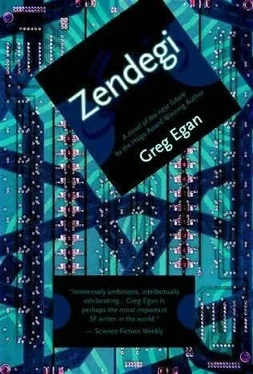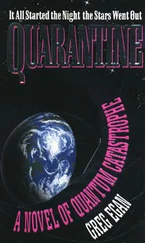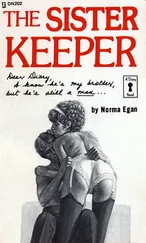They came to their first junction. ‘Raast ya chap?’ Martin asked.
‘We should toss a coin,’ Javeed suggested.
‘Hmm. I wonder…’ Martin reached into his pocket; the gloves interfered with his sense of touch, but from the sensation against his leg through the material of his trousers he was fairly sure he’d gripped a thousand-rial coin. But when he took his hand out, Zendegi was either unable or unwilling to acknowledge the coin’s existence. ‘No. Maybe next time we can find out how to get some local currency.’ He put the invisible coin back in his pocket carefully, not wanting to drop it into the sphere and trip up on it later.
‘Raast,’ Javeed decided. They turned to the right.
After a while Martin heard children’s voices, shouts echoing between the tiles from somewhere not too far away. ‘Hey! So we’re not alone.’
‘What if they get to the fountain before us?’ Javeed’s icon managed a near-perfect it’s the end of the world if I don’t win look.
‘I don’t know. Do you want to go faster?’
Javeed nodded enthusiastically. Martin started jogging, and Javeed ran to keep up with him. It was hard to accept, viscerally, that there could be no grazed knees from the rocky ground here – let alone the kind of tearful collisions with the walls that were almost guaranteed in the real world, when Javeed had friends over and they chased each other from room to room. Martin didn’t want to keep fretting about the downside, but he wondered if the mismatch between visual cues and physical consequences might stunt a child’s instincts for dealing with obstacles in real life.
The passage turned left, offering them no choice this time. Martin heard footsteps and saw a child darting across an intersection twenty metres or so ahead of them; he or she was gone in an instant, but the voices were closer, and it sounded as if the child was a straggler chasing a group of friends. Javeed pumped his limbs harder, determined to catch up; Martin felt his own pace switch from effortless to distinctly sweaty.
They reached the intersection and turned right, the way the child had gone, taking them into a short passage that ended in a T-junction. Martin heard laughter that sounded very close, but the echoes made it impossible to judge the direction.
‘Which way?’ Javeed fretted.
‘Right,’ Martin said firmly, for no particular reason. When they’d first gone in, he’d had some vague idea of using the keep-the-wall-to-your-right rule, which at least had the virtue that you wouldn’t end up going around in circles. But he was beginning to suspect that their free trial would run out long before they solved the maze, whatever strategy they adopted.
They took the right turn, then the passage forced them left, then left again… into a cul-de-sac. Javeed stood at the wall, scowling; the set of his mouth wasn’t quite authentic, but Martin recognised the signs of an incipient tantrum immediately. He leant down beside him. ‘This is what mazes are for,’ he said gently, ‘to get lost in, to make mistakes.’
‘You said “right”!’ Javeed replied accusingly, utterly oblivious to Martin’s suggestion that this setback could be acceptable, let alone desirable.
‘So we’ll go back to the same place and turn left.’
‘But we’ve lost them now!’
‘Maybe. We’ll see.’
Javeed followed him out of the dead end, sulkily refusing to be hurried. Martin examined the mosaics around them, trying to commit the pattern to memory just in case there was some kind of visual cue marking the routes that led nowhere.
Back at the T-junction, they continued down the passage into the unexplored arm. It wasn’t long before Javeed’s disappointment had faded and they were running again – gloriously confused, if not quite lost. Martin kept hearing shouts and snatches of laughter, always children’s voices. The sound of these elusive playmates made him want to whisper to Javeed, ‘Do you think there are ghosts here? Maybe this is a haunted maze, full of children who never found their way out.’ But he struggled to recall how old he’d been himself before such a notion would have elicited an enjoyable thrill, rather than sheer terror. It seemed wiser to err on the side of caution.
Then they took a turn and suddenly the children were all around them, coming in the opposite direction and almost colliding with them. There were more than a dozen, as real and unghostly as he and Javeed were to each other. ‘Not that way!’ one of the girls scolded Javeed in Farsi. A boy added, ‘We went that way already, it’s a dead end.’
Javeed looked confused for a moment, but then he seemed to bond with the group in an instant, with no need for any adult nonsense: no exchange of names, no empty pleasantries, just a discussion of the matter at hand. The children barely acknowledged Martin, but that felt more like a kind of politeness than a deliberate rebuff; they simply weren’t presuming that an adult stranger would want to speak with them, let alone be a part of their game. Martin wasn’t comfortable letting Javeed out of his sight, though, so he tagged along beside him as the mob headed back down the passage, and some of the children attempted to explain to Javeed where they’d been so far and where they thought they were going. Martin couldn’t work out if they’d been performing a systematic sweep of the maze, but he wasn’t about to intrude with his own questions or advice. And Javeed was reconciled to the fact that he wasn’t going to win any race now; it was enough that he’d been accepted into this group.
Martin let the boisterous chatter flow past him, just keeping an eye on Javeed and checking the mosaics for clues. When the group hit another dead end there were complaints and recriminations, but there was too much collective energy for anyone to start sulking, and no opportunity for disenchantment to lead to blows. Ten minutes later, Martin noticed a distinctive crowding of the mosaic’s features that he’d seen twice before. Sure enough, a few turns later they reached yet another cul-de-sac. If he’d been alone with Javeed he would have stopped and explained the discovery to him, but as things stood he didn’t want to interfere with the children’s own plans. As they retraced their steps, Javeed chatted happily with the girl beside him, sharing his somewhat optimistic vision of school. ‘And I’m going to build a model plane, and then I’m going to build a car-’
‘You can build a plane in Zendegi,’ she interjected, ‘big enough to fly in.’
Javeed was speechless.
Martin could see the pattern on the walls growing simpler and more spacious, until they came to a junction where it was almost pared down to a sequence of eight-pointed stars sitting alone in a square grid; all the delicate complications and adornments had been stripped away. The children walked right past this signpost – but five minutes later their own haphazard strategy brought them back to it.
When they reached the end of the passage and took one last obligatory turn, they found themselves in a courtyard in the centre of the maze. Directly in front of them was an octagonal fountain carved from white stone.
Shouts of triumph filled the courtyard. Javeed was ecstatic, jumping up and down with delight; Martin wished he could have lofted him into the air, though the way his back had been lately he probably should be grateful that it was impossible here.
‘I want to throw a coin in the fountain!’ Javeed said. Martin held out his empty hands. ‘They don’t take our money here, remember?’ No doubt that would be easily fixed once they had Martin’s credit card details.
Some of the children were gathering around the fountain, searching for a hidden reward. Martin and Javeed joined them, but Martin was curious about more basic things than game-loot. Zendegi wouldn’t play along if you insisted on trying to occupy the same location as a solid object, but what about water?
Читать дальше











